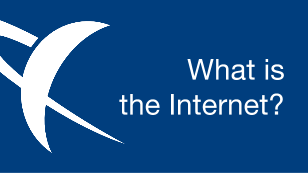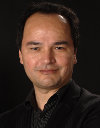Blog
What is the Internet?
 "The size of the Internet... in it's complexity... is the size of your brain... your brain works kind of the same way the web works" (Kelly, K 2007)
"The size of the Internet... in it's complexity... is the size of your brain... your brain works kind of the same way the web works" (Kelly, K 2007)
When most people think of the Internet they're actually thinking about the World Wide Web. The Internet has always been far more than that. At one time, before it began, it was called the Intergalactic Network which indicates that it was destined to be the communications medium not just for our planet but our Galaxy."The technology we are concerned with is the transformation of information into digital form, where it can be manipulated by computers and transmitted by networks. The driving force behind this transformation is the remarkable science of semiconductors, which has shifted the world's economy from an industrial one to an information base in a little over a quarter of a century." (Downs and Mui p. 5)
The Internet is every digital device that can talk to other digital devices using an international network. When we use a GPS to find a location we're accessing the Internet. When you send a TXT to a friend you're accessing the Internet. When your heart monitor notifies your Doctor of your heart rate it is using the Internet. When you think of the Internet this way you start to see the "bigger picture". The Internet is not just web pages that are a little bit better than TV. It is the largest, most reliable and smartest machine that mankind has ever created and it's doubling in size every two years.
Kevin Kelly, whilst speaking at the 2007 Technology, Education and Design (TED) conference describes the Internet as a machine perfectly. Here's some key points:- The Internet is less than 5000 days old
- We have more access to information than any other time in Human history
- With the advent of the Internet the impossible happened such as the majority of information being free, global communities sharing and creating content together
- It uses 5% of global electricity on the planet
- By 2040 the Internet will exceed the total processing power of all humanity
If the television screen can be seen as an extension of our eyes (refer to my last Blog "We are Cyborgs") then the Internet can be seen as an extension of all our senses. We might even go so far as to say that the human race is now becoming extensions of it:- Websites like Photosynth (http://photosynth.net) use all of the photos on the net to create a 3D representation of a place. So the machine extends itself by using the information that humankind created (photos) to extend itself and create new online 3D worlds.
- With over 6 billion humans searching and creating content on the web; we are the web. We become the Internet's "eyes and ears" of the World and continually store our experiences and knowledge in its memory.
- Eventually all recordable knowledge will be stored on the Internet and we'll access it from all our Internet devices such as laptops, phones or even our fridge. Some of the first examples of this can be seen in Software as a Service (SaaS) and Cloud computing services such as Google Docs and Amazon's EC2 network.
"Convergence is taking place within the same appliances, within the same franchise, within the same company, within the brain of the consumer, within the same fandom. Convergence involves both a change in the way media is produced and a change in the way media is consumed. (Jenkins, H. p. 16)
So what does this mean for us? How will it effect Governments, privacy, equity, commerce? I'll address these issues in my following blogs.Bibliography
Jenkins, Henry. (2006) Convergence Culture: Where old and new media collide. New York University Press, New York.
Kevin Kelly on the next 5,000 days of the web. Ted Conference. http://www.ted.com/talks/ kevin_kelly_on_the_next_5_000_days_of_the_web.html
Larry Downs, Cunka Mui. (1998) Unleashing the Killer App: Digital Strategies for Market Dominance. Harvard Business School Press: Boston, Massachusetts.
 About
About
Brynn


